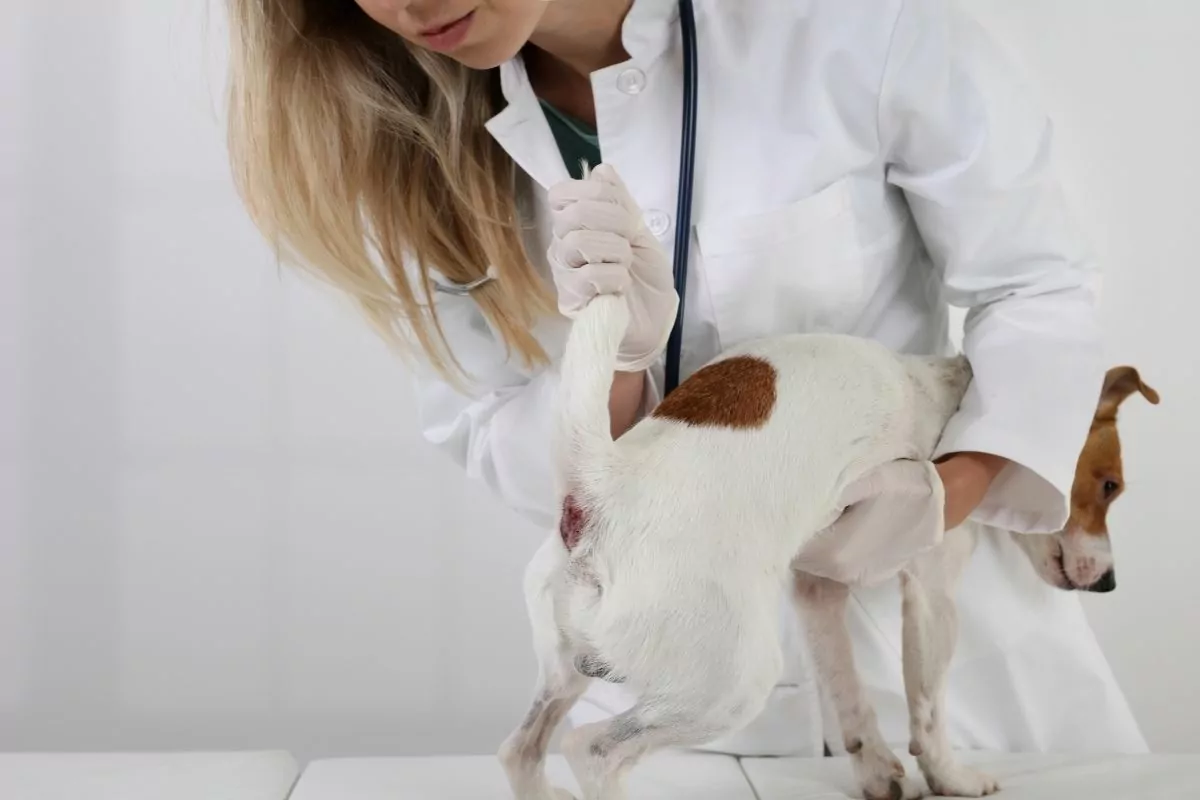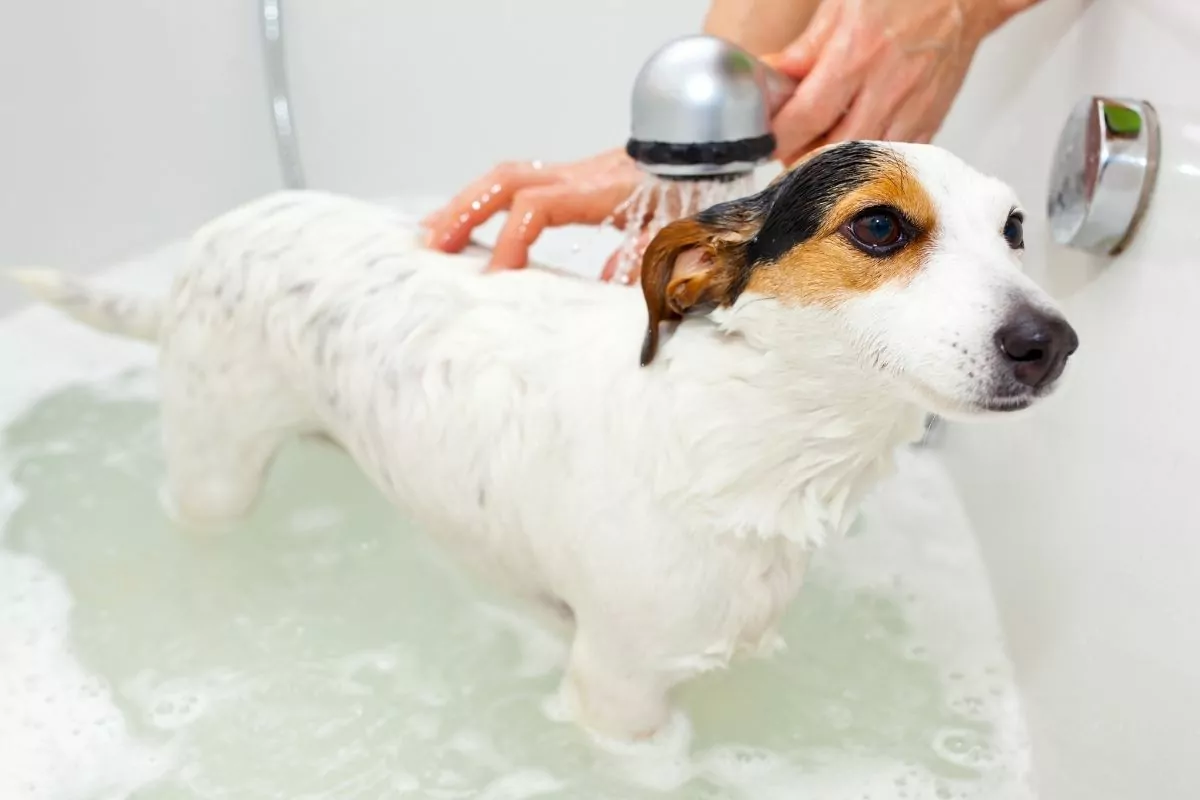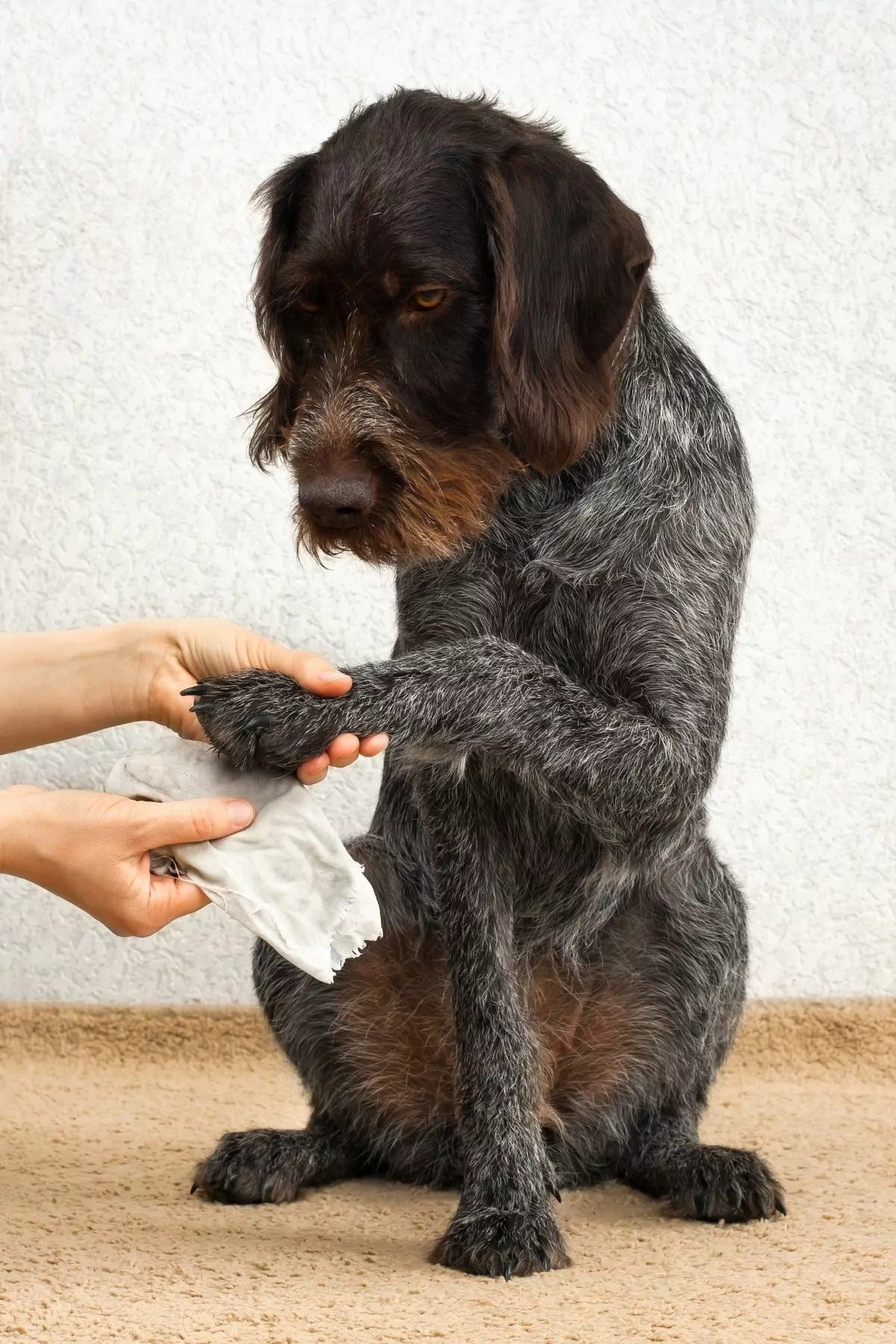What are Anal Glands in Dogs?
Most dog owners are unfortunately well aware of anal glands, but if you’re lucky enough not to know, then you may find yourself thinking, “why does my dog smell like fish?”
The anal glands are two small specialized sweat glands that reside on each side of a dog’s rectum. Anal glands release a secretion that acts as a scent marker on feces each time your dog poops. This stinky secretion is commonly described as having a fishy odor, and it functions to communicate to other dogs.
When your dog releases their anal glands, you may notice a fishy odor, but this isn’t the only cause; read on to find out more!

Reasons Why Your Dog Smells Like Fish
Dogs should not smell strong, and if they do smell, it should be a mild musty smell. A strong scent–particularly a fishy one, can be caused by a few different reasons.
Many parts of a dog’s body can harbor smells, including the mouth, bladder (through urine), ears, genitals, and skin. These are described in more detail below.
Another common cause of a fishy-smelling dog is when the anal sacs are released or diseased. Although it is normal for anal gland secretions to be released onto the poop when your dog goes potty, any residue on the skin could cause a transitory smell but shouldn’t linger for long. However, a diseased anal gland will continue to smell long after your dog has finished toileting.
There are three common anal sac diseases, the first being impaction. This occurs when the fluid in the anal sacs is not wholly evacuated after toileting. The remaining liquid can dry out and become difficult to express the next time your dog toilets –leading to impaction. This is the least severe condition but can be relieved through manual expression. Your groomer or vet clinic can help with this!
The second, more severe condition involves infection and abscessation of the anal sac. This can occur from an untreated impaction that becomes infected. The anal sac is often discolored and swollen, and when palpated it can be very sore. In severe situations, the anal sac may rupture.
The third anal sac disease is anal sac tumors. The good news is these are rare, but the bad news is they are severe. If your veterinarian suspects a tumor, samples may be taken, and surgery may be necessary.
Whatever the cause, if you notice an abnormal smell coming from your pooch, it is best to get them to the vet to check it out. Smells can be a sign of disease or infection and should not be left to fester!
The Signs of Anal Sac Disease (Causes of Fishy Dog Smells)
As described above, a common sign of anal sac disease is a fishy smell coming from your dog, but this isn’t the only sign that there is a problem with the anal sacs. You may notice your dog scooting their irritated anal sacs on the floor; they may bite or lick repeatedly at their anus, some dogs will constantly sit down.
Your dog may begin strain to defecate and may whine due to the pain. Sometimes owners may notice a hard lump near the rectum or see a swelling. There may be blood or pus in the stool as your dog’s diseased anal gland is expressed when they toilet.
In more severe cases, the anal gland may rupture, and you may see a wound on one side of the anal gland, this is typically very painful, and your dog may resist you examining the area. In addition, if your dog has repeated issues with anal glands, you may become more sensitive to the cues your dog gives that there’s a problem which can allow you to act quickly.
If you suspect your dog has an anal sac disease, it is best to get them examined by a vet to prevent more serious consequences.
How to Control That Fishy Canine Smell?
The first step to removing a fishy smell is by treating the cause. An abnormal smell coming from your dog should prompt a visit to the vet where they can help to determine the cause. It could be as simple as regularly bathing your dog or as severe as a condition requiring surgery.
If your veterinarian finds nothing wrong, it is recommended to ensure you are feeding a high-quality diet, bathing your dog regularly with appropriate dog shampoo (not human shampoo), and taking care of their hygiene such as regular grooming, teeth brushing, and ear cleaning. Failing that, using a safe dog deodorizer can keep your dog smelling great.

How to Prevent Anal Sac Disease?
Not all anal sac diseases can be prevented, but there are some things you can try to help. Anal sac disease is often caused by anal sacs that aren’t fully emptied at their root. This can be caused by feces that are too soft to push on the anal gland. Other recommendations to implement include:
- Preventing anal sac disease from starting. It is recommended that your dog is fed an appropriate diet with enough fiber to bulk up the feces.
- Avoiding excess weight and exercise your dog regularly.
- Encouraging your dog to drink plenty of fresh water and monitor their behavior to pick up on signs of disease early.
Some dogs may require regular anal sac emptying. This can be performed at your veterinary clinic.
What to do if Your Dog’s Breath Smells Like Fish
Fishy breath could have lots of different causes. Some examples include digestive problems, dental disease, or an infection in the mouth. Less commonly, bad breath can signify systemic diseases such as kidney disease or Diabetes Mellitus.
In severe but infrequent circumstances, tumors can develop in the mouth, leading to a bad smell. Problems with the mouth may also cause signs such as pain when eating, bleeding of the gums, and weight loss.
If you think your dog has a problem with its mouth, it is crucial to seek veterinary advice as the condition could be painful, and catching it early will help aid in a better outcome.
My Dog’s Butt Smells Like Fish – What Should I Do?
If your dog’s backend is smelling like fish, it could be caused by anal gland disease, urinary problems, or a skin infection. If the smell doesn’t resolve with a bath, then seek veterinary attention for more advice.
What to do if Your Dog’s Pee Smells Like Fish
Your dog’s urine shouldn’t have a strong smell. If you are beginning to notice your dog’s pee smells like fish, then something could be amiss. An infection of the urinary tract is a common cause of the abnormal smell of urine in dogs.
If your dog has a UTI, you may also notice they strain to urinate, have blood in their urine or cry out when they pass urine. The urine may also smell if there’s an infection of your dog’s genitals.
If there is any new smell to your dog’s urine, a veterinarian should check it out. If you can collect a sample (ideally the first one of the day, during the middle of the pee) and bring it with you– even better, as your veterinarian may be able to test it and help get some answers.
Why are Some Dogs Smellier Than Others?
Some dogs are naturally more smelly than others. Differences in their skin and coat can cause this.
Dogs such as Retrievers and Cocker Spaniels are naturally more oily due to their proclivity for water. A buildup of oil on the skin can become smelly. Regular baths with a doggy shampoo can help to reduce the smell and keep the skin healthy.
Other dogs such as Bulldogs and Sharpeis are bred to have excess skin and skin folds. These can trap moisture and lead to a proliferation of yeast and bacteria, leading to foul odor. Using dog-safe wipes to clean between skin folds regularly can keep them clean and smell-free.

Why Does My Female Dog Smell Like Fish?
Anal sac disease is just one cause of a fishy smell in female dogs. Female dogs may also develop a scent if there is a problem with their specific anatomy. For example, urinary tract infections are more common in female dogs due to their shorter, wider urethra, which is easier for bacteria to travel up and into the bladder.
Bacterial and yeast infections of the vagina can develop, especially if there are conformation problems or the dog isn’t cleaned regularly. Female dogs with long fur may develop matts, or feces can become trapped, leading to infection.
Dogs with poor mobility may lie in their urine, leading to scalding and skin infection, which can become smelly. If your female dog develops an unusual odor, it could be a sign of disease, and a veterinarian should examine them.
Promoting Anal Gland Health
Fiber supplements can be used to bulk up the feces of dogs with chronic anal gland problems. These are beneficial in promoting anal gland health. You may find that by using a fiber supplement, the anal glands need to be expressed less commonly.
Pumpkin is a great natural fiber supplement. Canned pumpkin can be added to the food, or a canine flax seed supplement could be tried.
It is essential to realize that adding fiber to your dogs’ diet may make them more thirsty, so make sure to have plenty of fresh, clean water available. Also, too much fiber can cause constipation or diarrhea. Both are problems that won’t help with anal gland health. Your veterinarian will be able to advise on the appropriate amount of fiber your dog needs.
Dogs with skin allergies, hypothyroidism, or infections elsewhere may be more prone to anal sac disease. By treating underlying conditions first, this may help to resolve the anal gland issues.
If you are struggling with your dogs’ anal glands, make sure to seek veterinary advice.
Why Your Dog Smells Like Fish When They’re Scared
When a dog is scared, it may start to smell. This is because some dogs release their anal glands, which fill the room with the characteristic fishy smell.
As you will have learned, anal sac diseases can be caused by impactions, infections, and neoplasia. But anal sac disease is not the only cause of a fishy smell.
If you notice a sudden fishy odor coming from your dog, your best bet is to seek veterinary advice. The sooner you seek help, the sooner your pooch can stop stinking up your house.
